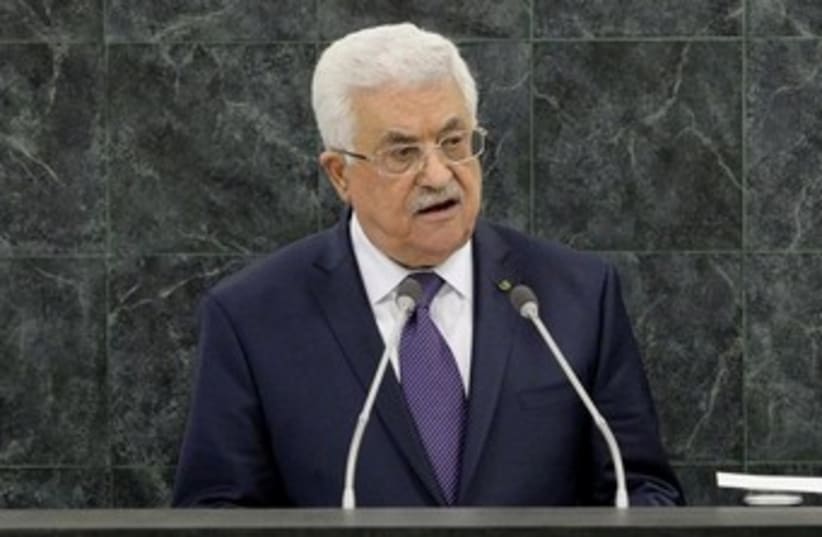Peace between Israel and the Palestinians will result in recognition of Israel from 57 Arab states, Palestinian Authority President Mahmoud Abbas said during his speech at the UN General Assembly in New York on Thursday."Let us envision another future... in which Israel will gain the recognition of 57 Arab and Muslim countries and where the States of Palestine and Israel will coexist in peace, in order to realize each people's hopes for progress and prosperity," he said.Read Abbas's full speech here.In his speech, Abbas reassured the international community that the Palestinians' new status at the UN would not compromise the fragile calm on the ground."The quest to raise Palestine's status does not aim at delegitimizing any existing state, that is, the state of Israel," Abbas said, "but to consecrate the legitimacy of a state that must exist, which is Palestine."Abbas spoke at length about the peace process, warning that the window of opportunity for peace is closing."Time is running out, and the window of peace is narrowing and the opportunities are diminishing. The current round of negotiations appears to be a last chance to realize a just peace," he said."We must remind all, and recall ourselves, that we do not start in a vacuum or from point zero, nor are we lost in a labyrinth without a map. The goal of peace is embodied in redressing the historic, unprecedented injustice that befell the Palestinian people in 1948."He went on to say that Yasser Arafat, the PLO, and subsequent Palestinian leaders have worked "with dedication to implement [the Oslo Accords] in order to end the occupation and realize a just peace," and enumerated how Palestinian leaders have worked diligently to uphold its responsibilities."But 20 years on, the picture appears bleak," Abbas said. "The goal of peace was not achieved, its provisions were not implemented, its deadlines were not respected. And all the while, continuing intense settlement construction... struck a deep fracture in the cornerstone of the peace process, the two-state solution."Abbas went on to list numerous grievances Palestinians hold against the settlers, including 708 of what he called "terrorist attacks" since the beginning of the year against Palestinian mosques and churches, and the destruction of 850 homes and structures.He urged the international community to act to stop continued Israeli settlement building and "exert every effort to make [the talks] succeed.""The international community is asked to remain alert to condemn and stop any actions on the ground that would undermine negotiations... above all, to the continuation of settlement construction on our Palestinian land, particularly in Jerusalem," he added.In addition to harshly criticizing Israeli settlement building, Abbas also called on Israel "to stop relying on exaggerated security pretexts and obsessions in order to consecrate occupation, and to stop contriving demands that push the conflict from its defined political terrain towards the abyss of religious conflict."The PA president cautioned against reaching an interim agreement, saying the Palestinians "refuse to enter into a vortex of a new interim agreement that becomes eternalized, or to enter into transitional arrangements that will become a fixed rule rather than an urgent exception.""The objective of the negotiations is to secure a lasting peace accord that leads immediately to the establishment of the independence of a fully sovereign State of Palestine, with east Jerusalem as its capital, on all of the Palestinian lands occupied in 1967," Abbas said.He also stressed the importance of the Palestinian right of return, citing UN resolution 194 on the issue.Abbas met with US President Barack Obama on Tuesday afternoon following Obama's speech to the UN, in which the American President also struck a tone of encouragement and renewed optimism in the face of the restarted peace process, and said that the Israel-Palestinian conflict would be one of his top two foreign policy priorities for the remainder of his term.The Israeli delegation was not present for Abbas's speech due to the Simchat Torah holiday, a spokeswoman for the UN Mission told The Jerusalem Post.Strategic Affairs Minister Yuval Steinitz called Abbas'speech "disappointing," especially for failing to recognizeIsrael as a Jewish state. "The tricky thing is he says he doesn't want to delegitimizeIsrael with one move, and then he delegitimizes Israel withother moves, like refusing to accept that Israel was establishedand has a right to exist as a Jewish state," Steinitz, who wasin New York for the General Assembly, told Reuters.
But opposition leader, ShellyYacimovich called on Prime Minister Binyamin Netanyahu to respond by doing more for peace.
She said the "moderate remarks" by Abbas - compared to hismore strident UN speech a year earlier - "foster cautious hopethat we face a new era of dialogue that might lead to anaccord," according to a statement from her office.
Reuters contributed to this report.
